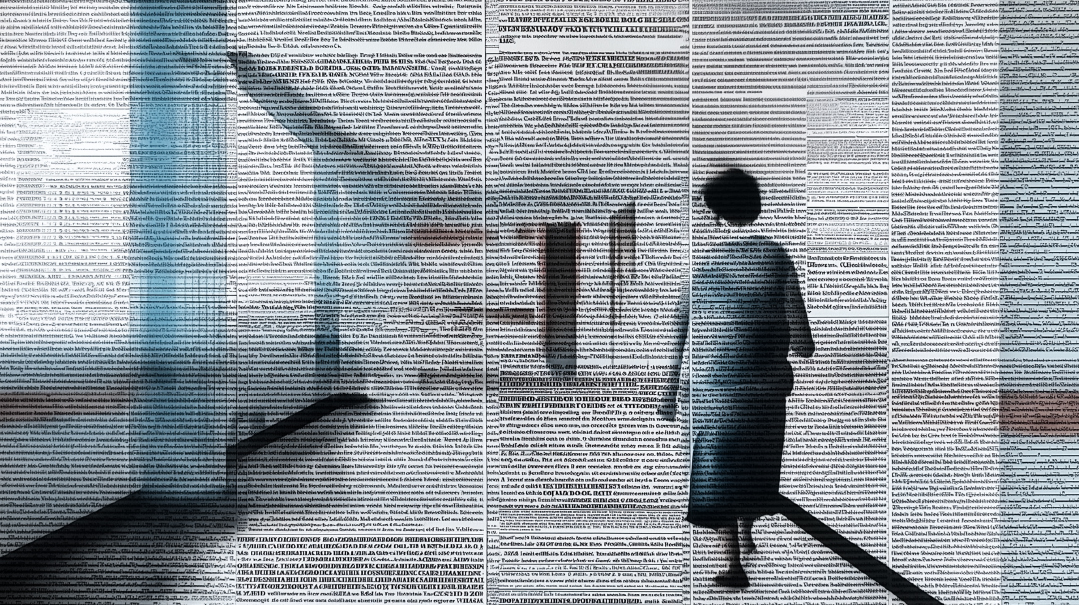In Peace: Part 2 of 3
| July 22, 2025Writing may help her. What might help me right now is to smash something. Break, crush, and demolish something so it can never be glued back together

SUNDAY
“I’m waving from where I stand, do you remember me now?”
The light is glaring between the slats in the blinds. It’s two o’clock in the afternoon. Rivky will have a field day going on and on about how lazy, undisciplined, and utterly useless I am at doing anything that requires brain cells. I can feel her anger already.
I need a double shot of coffee to combat her voice in my head.
Miri knocks on the door. “Ma, are you up yet?”
I grunt, roll over, reaching for my phone to glance at a text I missed earlier. It’s Shmuel. Saying he had to deal with an emergency at work and will be back later to pick up the kids. I grunt again.
“Yeah, I am.”
She comes in and flicks the light on.
“Miri, I’m sleeping.” I shade my eyes.
Miri laughs. “You said you weren’t. I’m going to bake now. I wasn’t going to tell you, but I can’t find where Babi keeps the oil or the cocoa.”
“You are not baking.”
“I already started. Do you want a half-concocted mess in her kitchen, or can I please make brownie fudge cupcakes, they are sooo good.”
I give up. “Okay. The cocoa is in the cabinet next to the fridge and the oil is under the sink. Just be quiet downstairs, people are there.”
“I can be quiet.”
“I wasn’t implying you can’t.”
“You were.” She huffs.
“Close the light when you leave.”
“Are you coming down?”
“Just close the light.”
I
make it down the stairs 20 minutes later. “Why is he dead?” Miri asks when I pass the kitchen.
I look at her, her flour-covered face, hands constantly in motion. She is cracking eggs, measuring sugar, and she looks like she belongs in my father’s kitchen doing the thing he loved; I see him in her.
“Don’t say dead,” I warn.
“Why not? He is dead so—”
I stare at her.
“There are people in there.” She points to the living room.
“Miri, don’t do that. I want to talk to you.”
I look at her. I can almost see through her; I can almost see me.
She shrugs and resumes measuring ingredients, and for a while, it’s quiet, a thick awkward silence you can slice. I feel like I am intruding, but if I leave, I’ll be doing something wrong.
Suddenly, with her back to me, she says, “There has to be a reason he’s dead, right?” She says “dead” on purpose.
I run my hand through my wig and exhale. “I am sure there is.”
“Well, I want to know why.”
“We don’t get to see the plan. That’s not the way it works. Things happen and we have to accept them.”
I see her eyes harden. “You should be a hashkafah teacher,” she says.
“You should listen to your hashkafah teacher and then you wouldn’t be suspended,” I say without thinking.
I’ve sucked all the sound out of the room, like a void.
“You have to bring it up every chance you get! ” Miri yells.
“I’m sorry. Stop yelling, there are people in the other room.”
I hate it. I hate what I just did.
“You should write,” I tell her before I leave the messy kitchen. “About your Zeidy. A poem or something. It will be cathartic.”
“Is this the same stupid advice you give to your students?”
“Cathartic is an interesting word,” I say, ignoring Miri’s outburst. “It sounds exactly like what it means.”
Writing may help her. What might help me right now is to smash something. Break, crush, and demolish something so it can never be glued back together. Then I will have something not unlike myself.
I enter the living room, which is infested with people and feelings. Rivky saunters over to me. “I heard you out there,” she says, tilting her head to the kitchen, where I’m sure I hear strains of Miri’s music.
I shake my head. “What’s your point?”
“You’re a mechaneches, right?”
“So?”
I search her tired yet flawless face until I see it — she’s making fun of me. She’s saying I can’t possibly be good at my job. She is right. Sometimes I wish the principal hadn’t chosen me for this job. I wish I was still an English teacher.
“I’m a good teacher,” I say, unsure if I’m convincing her or myself.
“Yeah, right.”
“I really am, Rivky. There’s this girl in my class, Atari, she’s going through a very hard time, and of all her teachers, I’m the one getting through to her. I got her to start caring about her homework again, and I speak to her about the stuff that’s going on. I’m a good teacher.”
“I’m sure you are,” she says.
I want her to say what I know she’s thinking: But you’re not a good mom. But she just walks away, and I go back to the kitchen to yell at Miri for forgetting to connect her music to her Bluetooth.
Why am I so hard on the people I love?
W
hen Shmuel comes back to take the girls home, I get a goodbye kiss from Bracha and a barely noticeable nod from my teenage daughter.
“I’ll be back tomorrow sometime,” he says as he lugs his suitcase out the door.
“Don’t go,” I say.
“It’s just for today.”
“Shmuel, don’t go.”
His face goes grim. “This isn’t like your father. I’m coming back.”
“I know,” I cry.
“Do you though?”
I shake my head. My lips tremble.
“I’ll be back.”
Don’t say that. He said that, too. When my father called me on Wednesday, he said, talk to you soon, except there will never be a soon. There will never be talking. He isn’t here anymore.
I’ve been out of bed for just a few hours, and all I want is to go back to sleep. I don’t, though. There are people in the living room.
I
t’s been 20 minutes since Shmuel left to take the girls home. No new texts, no missed calls. Was there an accident? Are they okay? For how long will these be my first thoughts whenever Shmuel leaves? For work, to shul, to carpool. How many more times is my heart going to beat like a hurricane?
L
ater, when I go up to bed, there’s a chocolate fudge cupcake on the dresser.
Miri. She is so sweet.
Miri. She is so expelled.
There’s a note under the cupcake. In her tiny scrawl. I realize she wrote a poem.
I almost love her for it.
She wrote a poem. What if it was this easy to try again?
I lie awake for a long time, and finally I call Shmuel. He picks up on the second ring, muttering sleepily.
“Shmuel, are you up?” I see shadows on the wall. My room is haunted, Tatty’s sweater is swallowing me.
“Yes, I’m up.” He responds groggily. I know him, he’s rubbing his eyes now and sitting up in his bed in our home.
“How are the kids?”
“Good.”
“Did they have pizza for supper?”
“Yes. And they’re asleep. Henny, it’s so late. Are you okay?”
“I can’t sleep.”
“I can see that,” he says.
“Can you stay on the line until I fall asleep?” I ask.
“Yes.” And he does, just like Tatty did.
I pull the blanket up to my chin. I hear Shmuel breathing, and I mimic him. In and out and in and repeat.
“Should I talk?” he asks drowsily.
“If you talk, I can’t fall asleep.”
“Right,” he says. “Good night.”
I stare at the ceiling and listen to his uneven breaths. I think he falls asleep long before I do.
MONDAY
Tell me if it is harder,
To learn the art of letting go
Or cling with burning hands to the fraying rope?
Maybe it’s harder knowing and losing
Than never having or holding.
—Miri
“I sprained my foot last year. I had a boot and everything.”
I raise an eyebrow. “Sorry to hear that, Rivky.”
“Why don’t we ever talk?” she asks.
I laugh. “We’re talking now.”
“No. I mean real talk. You don’t know that I sprained my foot, and I don’t hear about your job. We never hang out together.”
“We live hours away and—”
“You want to tell me we can’t find a tiny pocket of time to talk to each other, share a funny story about our week, WhatsApp a picture of our kids? Do you know how awkward it is when an old friend asks me how my sister’s doing, and I have no idea?”
“Rivky, I’m confused, where does the sprained foot come in?”
“Can we just be sisters? Like real sisters?”
My
blouse feels unbearably uncomfortable today. It’s protesting the fact that I keep wearing it. But Rina doesn’t care, she has her arms around me, squeezing me. I think she’s crying.
I’ve intercepted her at her car before she even had a chance to make it onto the sidewalk.
“I want to go home,” I say in a voice not above a whisper.
“I want you to come home, too,” she says. She looks away. “Atari is here. I tried calling you to ask you if that’s okay, she wanted to come along.”
Atari is Rina’s 16-year-old daughter and my student. It felt like a conflict of interest when I first started teaching her in tenth grade. Sometimes, it still does.
Rina pulls apart from me and motions in the direction of the car.
When she comes out, Atari’s black hair flows to her waist, her eyes defiant. Rina looks at me, then at her daughter.
“I don’t know what I’m doing wrong,” she says. I want to tell her that I know the feeling, that I’m just like her. Miri and me and all the things we can’t say to each other, all the words we try to say, and how it always ends up going wrong.
“Well…” I walk into the house, not looking back to see if Rina and her daughter are following me. I walk all the way to the end of the hallway into the kitchen and out onto the porch in one straight line. Then I exhale a breath I hadn’t noticed I was holding.
“My mom went to be menachem avel your mom,” Atari says. The door to the porch is wide open, and she’s taking up all the space. I’ve known her since she was 11 years old. I have seen her in long skirts, short skirts, and even shorter skirts. I have sat in meetings where we decided her fate at our school. Where I vouched for her and said that she is still her. She is still the same Atari, and we can still reach her.
I feel like I am being taunted now.
“Do you want to sit and talk?” I ask. “I’ll have to go inside in a few minutes to talk to the people, but we can stay out here for a bit.” Atari has a heart so guarded, it takes a lot to get through the door.
“Atari?” My voice is gentle, like a river or a dream. I should save some of this voice for when I’m talking to Miri. I should sit and meet her eyes and hold space for all of her. “Atari, what’s going on?”
“I’m a mess,” she says.
“Sweetheart, it’s okay to be a mess sometimes. Did something specific happen?”
There’s a knock on the door and Leah comes outside. “Henny,” she says. Her tone says go inside, you have to go inside and sit on the low blue chair and do nothing other than cry and talk about your father.
“I don’t want to,” I mouth.
She squeezes my hand. “I got this. I’ll talk to her.”
That is a brilliant idea. Leah should deal with this. She’s the one with a degree. Five years ago, I was an English teacher. Ask Miri, and she’ll says she wishes I was still an English teacher. I know when my students should use a semicolon to take two ideas and make them a cohesive sentence. I can tell them about subject and verb agreement.
I go back into the house and leave Leah with Atari. I hear her introducing herself and asking Atari her name. She will do great. She will be kind and empathetic. Thinking about it now, I realize she would probably do great with Miri, too.
I don’t go to the living room; I climb the stairs to the second floor and sit on the top step looking down at all the people walking in and out. I’m eating a cupcake that Miri made yesterday, and ignoring any and all of the people who get up to leave. I hope they do me the courtesy of doing the same because I can’t explain why I am sitting on the steps, eating a cupcake.
It started on Wednesday night when I was told my father died and then it all became convoluted.
Rina says, “This is how you are choosing to grieve right now.” She is sitting with me, also eating a cupcake, choosing to sit with me. “These are good,” she says. “Miri made them?”
I
pass the kitchen to get water, and Leah is still talking to Atari. They’re sitting on the floor on the porch. Atari’s black hair is dancing with color.
Words filter through.
“I was kicked out of school,” Atari says. “And she fought for me. She got me back in.”
I didn’t do that for Miri, I realize with a start. I didn’t fight for her. I didn’t even listen to her.
“Yeah, Henny is wonderful,” Leah says. “You’re lucky to have her as a teacher.”
“Her kids are lucky to have her as a mom,” she says. I feel like I have been stabbed. A gut-wrenching pain under my ribs.
“She’s wrong, isn’t she?” Rivky says from behind me. She has a knack for showing up at the most inopportune time.
“What?” I ask, wiping at the tears I feel stinging my cheeks.
“If you’d give Miri half the love you give to your students, she’d probably flourish.” Each word drips with concern.
“What’s wrong with Miri?” I ask.
“She’s clearly struggling. You have such a beautiful family and you don’t appreciate it.”
“This is why we don’t talk,” I tell her. “You get jealous.”
“You think I’m jealous of you? Because you’re so perfect and such a wonderful mechaneches and the greatest human being ever. Have you seen your Miri lately?” she yells. Or maybe she doesn’t yell, maybe she’s just talking a little bit louder than normal, but she mentioned Miri and I’m instantly defensive.
“Yes! I think you are jealous of me and my three beautiful kids and my job and the fact that I am a step ahead of you, Rivky.”
Her nostrils flare. “Miri hates you,” she strikes back. “You didn’t have a normal conversation with her the whole time she was here. You’re like strangers.”
My anger swells. I know Atari is outside, so I don’t yell. I don’t even blink. I just hold the glass of water and watch my fingers tremble, watching as they shake and the glass shakes and the water spills.
“One of the things I hate,” I tell her, “is our relationship. I wish we could get along, Rivky, I do, and I don’t know why it just doesn’t work. But it doesn’t. Please stay out of my way, and I will stay out of yours.”
When the people leave with their words and their care, I stand where I saw Leah speak to Atari earlier. The porch door is between me and the woman Atari thinks I am.
If only you were as good a mom as you are a teacher. I blink furiously to get Rivky’s words out of my head, her jealousy, her anger — and how utterly right she is.
Because without her standing in front of me, preaching, I can see the truth. I stare at the reflection of my tear-streaked face and don’t turn away.
To be continued…
(Originally featured in Family First, Issue 953)
Oops! We could not locate your form.








Comments (0)